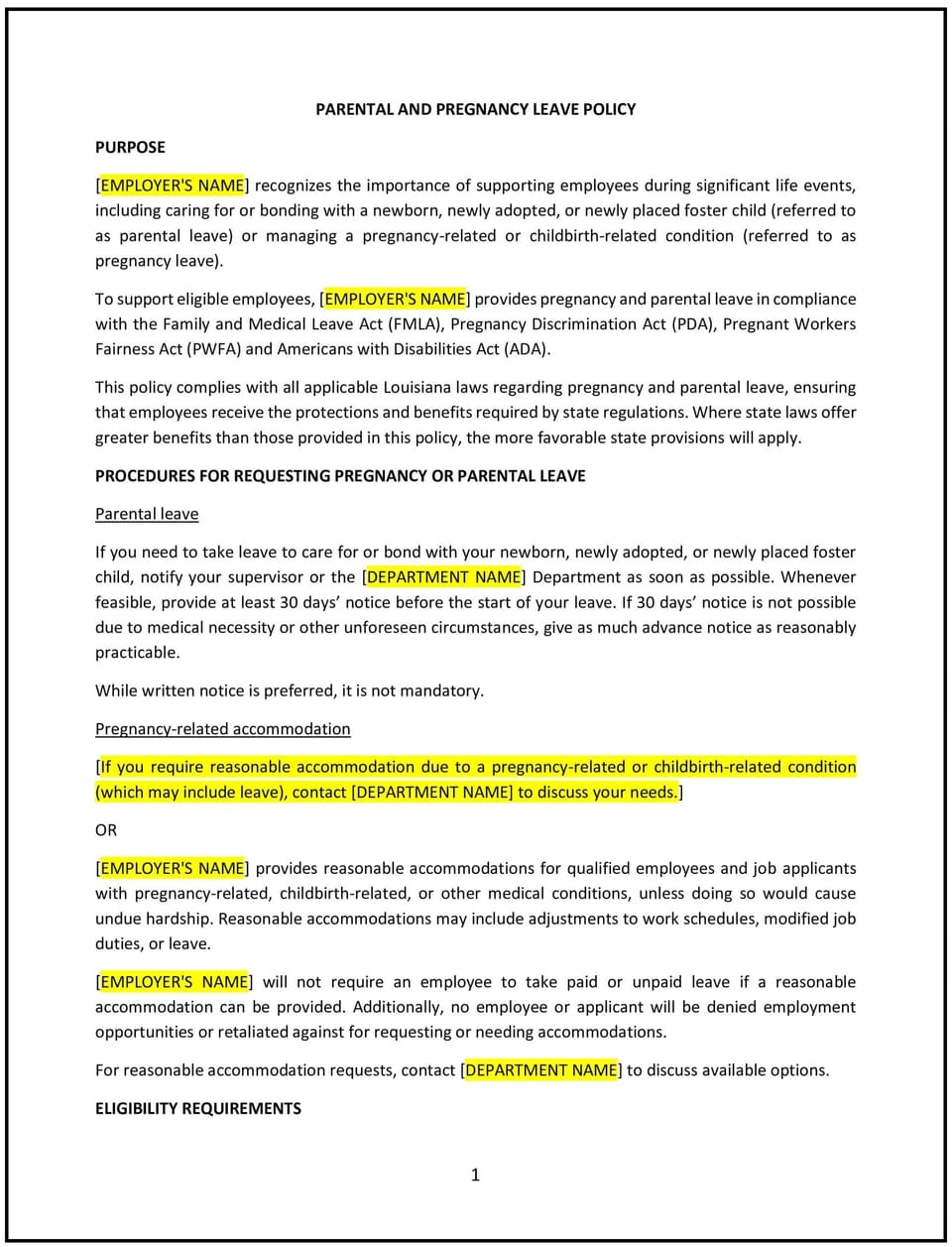Parental and pregnancy leave policy (Louisiana): Free template

Parental and pregnancy leave policy (Louisiana)
This parental and pregnancy leave policy is designed to help Louisiana businesses provide clear guidelines for employees needing leave for pregnancy, childbirth, or parenting responsibilities. It outlines eligibility, procedures, and support to foster a family-friendly workplace while maintaining operational efficiency.
By implementing this policy, businesses can support employee well-being, promote work-life balance, and retain top talent.
How to use this parental and pregnancy leave policy (Louisiana)
- Define eligibility: Specify which employees qualify for parental or pregnancy leave, such as full-time, part-time, or probationary employees.
- Outline leave options: Provide details about the duration of leave available for pregnancy, childbirth, adoption, or bonding with a child.
- Include leave request procedures: Detail how employees should apply for leave, including advance notice and required documentation.
- Address pay and benefits: Clarify whether the leave is paid or unpaid and how benefits like health insurance will be maintained.
- Communicate return-to-work procedures: Specify expectations for employees resuming work, such as timelines and documentation requirements.
- Include additional support: Highlight available resources, such as flexible work arrangements or employee assistance programs (EAPs).
Benefits of using a parental and pregnancy leave policy (Louisiana)
Implementing this policy provides several advantages for Louisiana businesses:
- Supports employee well-being: Provides time and support for employees managing pregnancy, childbirth, or parenting responsibilities.
- Enhances retention: Demonstrates a commitment to supporting employees through significant life events.
- Promotes work-life balance: Helps employees balance family needs with professional responsibilities.
- Clarifies expectations: Reduces misunderstandings by providing clear guidelines for requesting and taking leave.
- Reflects Louisiana-specific practices: Adapts to local cultural norms and workforce dynamics.
Tips for using this parental and pregnancy leave policy (Louisiana)
- Communicate clearly: Ensure employees are informed of their leave options and requirements during onboarding and policy updates.
- Train managers: Equip supervisors to handle leave requests with sensitivity and professionalism.
- Maintain documentation: Keep detailed records of leave requests, approvals, and communications to ensure transparency.
- Offer flexible arrangements: Consider additional support, such as remote work or adjusted hours, to ease the transition back to work.
- Update regularly: Review and revise the policy to reflect changes in workplace practices or Louisiana-specific considerations.
Q: Who is eligible for parental and pregnancy leave under this policy?
A: Eligibility typically depends on factors like employment status (e.g., full-time, part-time) and length of service, as outlined in the policy.
Q: How much leave is available for pregnancy or parental responsibilities?
A: Leave duration varies based on company policy but often includes several weeks for pregnancy, childbirth, or bonding with a new child.
Q: Is parental or pregnancy leave paid or unpaid?
A: Leave may be paid, unpaid, or a combination, depending on company policy and applicable benefits programs.
Q: What documentation is required to request leave?
A: Employees may need to provide medical certification, proof of adoption, or other relevant documentation to support their leave request.
Q: How can businesses support employees returning to work after leave?
A: Businesses can offer flexible work schedules, phased return plans, or access to resources like childcare support or employee assistance programs.
Q: How often should this policy be reviewed?
A: The policy should be reviewed annually or when workplace practices or Louisiana-specific regulations evolve.
Q: What steps can employees take to apply for leave under this policy?
A: Employees should notify their manager or HR in writing, provide required documentation, and discuss timelines for their leave and return.
This article contains general legal information and does not contain legal advice. Cobrief is not a law firm or a substitute for an attorney or law firm. The law is complex and changes often. For legal advice, please ask a lawyer.


